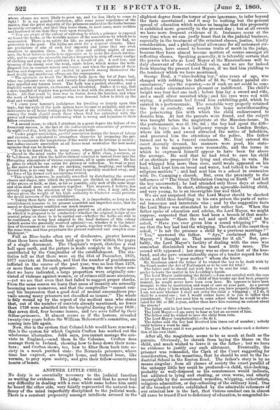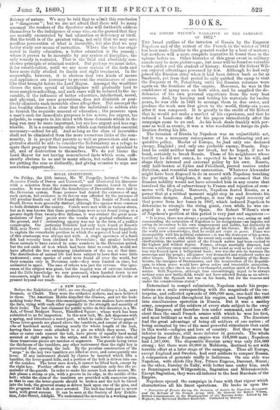ANOTHER LITTLE CHILD.
No duty is so essentially necessary to the judicial function as waiting for evidence. The judge, who said that he never had any difficulty in dealing with a case which came before him until he heard the other side, very faintly represented the natural ten- dency of -the mind imperfectly disciplined to the judicial work. There is a constant propensity amongst intellects aroused in the
slightest degree from the tomor of par' e ignorance, to infer beyond the facts ascertained ; and it may be nothing but the general spread of education which makes us imagine that this propensity is exhibited more generally in the present day ; but at all events we have more frequent evidence of it. Instances occur at the very time when we can justly boast that in the judicial business, especially in the treatment of the criminal classes, justice, kindly consideration, and a philosophical allowance for all untoward cir- cumstances, have ceased to become traits of merit in the judge, because they have almost become matters of course amongst all reflecting classes. Speaking generally, it is tolerably certain that the person who sits as Lord Mayor at the Mansionhouse will be duly observant of the established rules, and we are far indeed from blaming the present Lord Mayor, if we find him yielding to the tendency which we have mentioned.
George Deal, a "nice-looking boy," nine years of age, was charged with robbing his father of 81. 9s. "under painful cir- cumstances," says the reporter,—as if such an act could be com- mitted under circumstances pleasant or indifferent. The child's height was four feet one inch ; before him lay a sword and rifle, and a small silver mounted whip ; and his eyes were red with crying. A policeman had found him exhibiting gold, which he carried in a portemonnaie. The constable very properly retained the boy in custody, and sought his home notwithstanding the persevering lies with which the child endeavoured to deceive him. At last the parents were found, and the culprit was brought before the magistrate at the Mansion-house. In the portemonnaie was Si. 18s. 6d. ; the boy had spent the diffe- rence in toys ; also in a halfpenny voyage to London Bridge, where his rifle and, sword attracted the notice of beholders, and procured him the attentions of the police. His father turned out to be a funeral coachman. Mr. Deal entered the court decently dressed, his manners were good, his state- ments to the magistrate were reasonable, and the terms in which he expressed himself appear to have been far above the average. He said that he had tried to cure his child of an obstinate propensity for lying and stealing, in vain. He had whipped him more than once, until weals appeared on his back ; had kept him on bread and water, had talked to him "on religious matters " ; and had sent him to a school in connexion with Dr. Cumming s church. But, even the proximity to the influences of "The Great Tribulation Coming on Earth' had left the boyuncorrected ; he had attended only three days at school out of six weeks. In short, although an agreeable-looking child, and very young, he is an incorrigible liar and thief.
We are not surprised that the Lord Mayor should be shocked to see a child thus doubling in his own person the parts of natu- ral innocence and inveterate vice ; and by the suggestive facts the Lord Mayor was stimulated to infer rather fast. When the father spoke of education and advice the Lord Mayor, we might suppose, suspected that there had been a breach of that much- abused maxim "Spare the rod and spoil the child," and he asked, "Have you ever given him a sound whipping ?" We see that the boy had had the whipping. The clerk of the court then asked, "Is not the prisoner a child by a previous marriage ? " "Yes," answered the father. " Aye," exclaimed the Lord Mayor, "I thought so. That accounts for it all." But, pro- bably, the Lord Mayor's facility of dealing with the case was somewhat diminished when he heard a little more. The second wife appeared ; her story was as clear as that of the hus- band, and she gave unmistakeable signs of a tender regard for the child, and for his "poor mother" whom she knew.
Mr. Goodman asked the father if he wished the boy to be dealt with by the Court under the Act of Parliament or to be sent for trial ?
The father said he should not wish him to be sent for trial. He would prefer to leave the matter in his Lordship's hands. The Lord Mayor (addressing the father).—I am not satisfied with the case so far as you are concerned. If a child of this tender age had been properly trained, he would never have been seen here. He appears to have been brought to this by inattention and want of care on your part. As a parent you owe a duty to him which I cannot believe you have properly discharged. I am not sure whether I shall not order the enild a whipping ; if I do, it shall be a sound one ; but I would rather leave it to you to inflict that punishment. Can't you send him to some school where he would be edu- cated for 18/. or 201. a-year, rather than have him running an outcast about the streets ?
The father said he had been turned out of two or three schools.
The Lord Mayor.—I am sorry to hear so bad an account of him. The father said he wished to save the child from ruin.
The Lord Mayor (emphatically).—So do I. The father said the boy had deceived him times out of number; nobody could believe a word he said.
The Lord Mayor said it was painful to hear a father make such a declara- tion of his own child.
After all, the magistrate seems to be as much at fault as the parents. Obviously, he shrank from laying the blame on the child, and much wished to leave it on the father ; but we have no evidence to justify any such allotment. Eventually, the prisoner was remanded, the Clgrk of the Court suggesting for consideration, in the meantime, that he should be sent to the In- dustrial School in the Easton Road. The father's story is by no means singular; from all classes of society the exact parallel of the unhappy little boy could be produced—a child, nice-looking, probably as well-disposed as his countenance would indicate, but addicted to lying and stealing, or even worse, and utterly incorrigible by the accustomed remedies whipping, exhortation, r '
ions admonition or day-schooling of the ordinary kind. One of the broadest truths established by the admirable reformers of oar, criminal law is the fact, that vicious conduct can in almost all cases be traced if not to deficiency of education, to congenital de- ficiency of nature. We may be told that to admit this conclusion is " dangerous" ; but we are not afraid that there will be many amongst the readers of the Spectator who will forthwith address themselves to the indulgence of some vice, on the ground that they are morally exonerated by bad education or deficiency at birth. But the truth is of the greatest value, not only that we may save needless persecution of what is incurable, but also that we may better study our means of correction. Where the vice has origi- nated, in faulty education, a better education is the remedy ; where it proves to be incurable by any system of discipline, the only remedy is restraint. That is the final and absolutely con- clusive principle of criminal control. But perhaps we must defer, it for consideration, until we are more certain of the facts and have more fully studied its limits and right treatment. In the meanwhile, however, it is obvious that two kinds of means and appliances are necessary to prevent the continuance of cases like that brought before the Lord Mayor. Amongst the wealthier classes the mere spread of intelligence will gradually lead to more complete schooling, and such cases will be reduced to the in- curable, if the influence of better education, intellectual, moral, and physical., for some generations, does not diminish or posi- tively eliminate such incurable class altogether. But amongst the less wealthy classes it is clear that the individual is seldom able to furnish the requisite amount of education ; the pressure upon a man's cash for immediate purposes is too severe, too urgent, too palpable, to compete in his mind with those demands which in the long run may be more important, but are less urgent and less cog- nisable. It is a community alone which can furnish that essential necessary—school for all. And so long as the class of incurables shall not be eliminated from the more numerous links of the com- munity, it is proper that parents as well as prosecutors and ma- gistrates should be able to consider the Reformatory as a refuge to spare their progeny from becoming the instruments of mischief to all, and of destruction -to themselves. We do not blame the Lord Mayor for not having remembered facts which seem suffi- ciently obvious to us and to many others, but rather thank him for putting the case so distinctly, and giving occasion to urge our conviction opportunely.



























 Previous page
Previous page